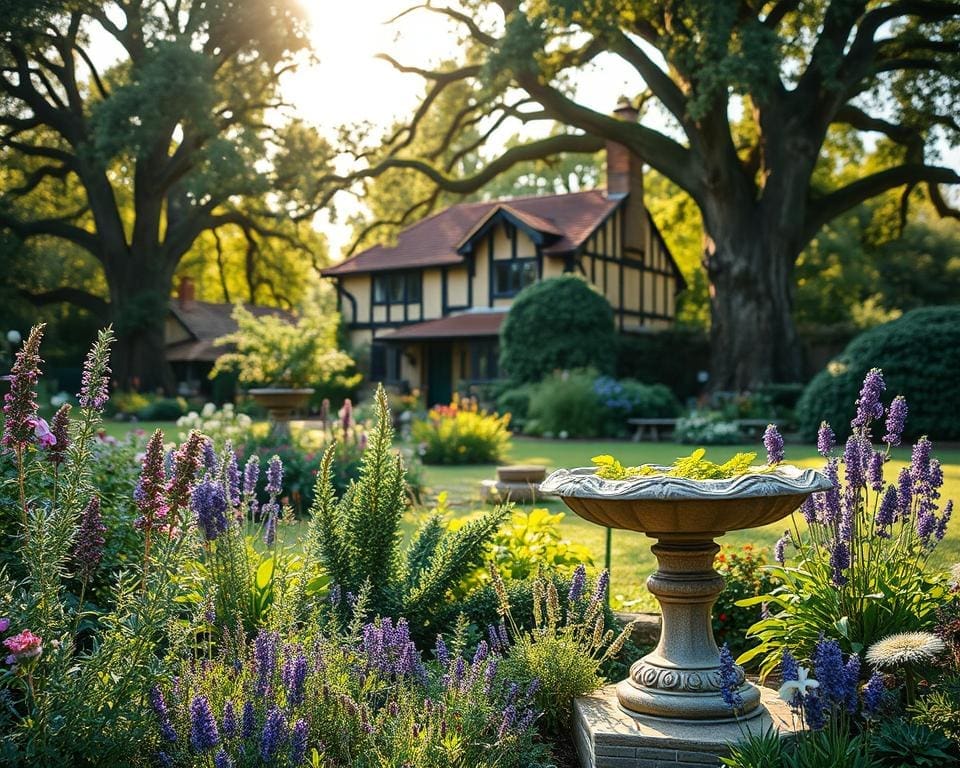Imagine stepping into a world where the enchantment of Shakespeare’s plays intertwines with the serene beauty of nature. How About Planting a Shakespeare-Themed Herb Garden? This delightful venture allows gardening enthusiasts and literature lovers alike to create a sanctuary that inspires creativity while nurturing herbs referenced in the bard’s works. A Shakespeare-themed herb garden isn’t just an outdoor project; it’s a journey that connects you to the rich tapestry of stories and characters that have captivated audiences for centuries. Embrace this opportunity to cultivate both plants and inspiration, as we explore Shakespeare garden ideas that will breathe life into your herb garden design.
The Inspiration Behind a Shakespearean Herb Garden
The Elizabethan era was a time rich with *literary gardening*, where the presence of herbs played a pivotal role in daily life and culinary practices. Shakespeare’s works reflect a deep understanding of the significance of these plants, intertwining them with themes of love, healing, and nature. His vivid descriptions create a tapestry that links specific herbs to emotions and events, revealing the profound connection between humanity and the natural world.
In exploring the cultural landscape of Shakespeare’s time, one can appreciate how historical herb gardens served various purposes—from culinary use to herbal remedies—echoing the intricate relationship between people and the flora surrounding them. The playwright drew inspiration from this environment, enhancing his storytelling through botanical references that resonate to this day.
Creating a Shakespearean herb garden today draws from this rich tapestry, merging aesthetic beauty with historical context. Enthusiasts can find joy in cultivating herbs like rosemary, thyme, and sage, each carrying with them a story linked to the Bard’s literature. Such gardens not only pay homage to Shakespeare’s legacy but foster a sense of tranquillity and inspiration for all who engage with the art of Shakespearean herb inspiration.

How About Planting a Shakespeare-Themed Herb Garden?
The allure of Shakespeare-inspired gardening seeks to merge the beauty of nature with literary inspiration. When contemplating planting herbs, the first step involves selecting a suitable location that enjoys ample sunlight, ideally six to eight hours per day. A well-drained space enhances the growth of herbs while allowing for proper drainage.
Timing your planting is crucial. The best period for sowing seeds or transplanting seedlings typically falls in early spring after the last frost. This timing promotes healthy development, aligning with the rustic renewal often celebrated in Shakespeare’s works.
When it comes to pairing herbs, consider those that not only thrive together but also hold significance in Shakespearean narratives. For instance, *rosemary*, linked to remembrance, and *thyme*, often associated with courage, can create a harmonious blend. These selections provide delightful herb garden ideas that resonate with the themes of memory and bravery echoed in his plays.
Creating a setting that serves as an aesthetic retreat will enhance your connection to the literary world. With thoughtful planning, planting herbs in a Shakespeare-themed herb garden allows for a unique celebration of English literature intertwined with the charm of nature.
Choosing Herbs Linked to Shakespeare’s Works
Planting a garden inspired by Shakespeare offers a wonderful opportunity to explore the rich tapestry of herbs featured in his works. While choosing herbs for a Shakespeare garden, consider the historical and cultural significance that these plants carry. They not only add beauty but also deepen the connection to the stories woven into his plays and poetry.
Popular Herbs in Shakespeare’s Plays
Shakespeare frequently referenced various herbs, with some gaining particular notoriety in his narratives. The following herbs stand out among the popular herbs in plays:
- Rosemary – Often associated with remembrance and fidelity, it appears in “Hamlet” as a symbol of loyalty.
- Thyme – Representing courage, thyme was mentioned in “Henry IV,” reminding audiences of valour and strength.
- Daisies – These flowers symbolise innocence and purity, finding their place in several of Shakespeare’s works.
The Symbolism of Specific Herbs
Understanding herb symbolism allows for a deeper appreciation of their roles within Shakespeare’s narratives. Each herb carries its own significance, influencing the tone of the plays. For instance:
- Rosemary is emblematic of memory and affection, making it a poignant symbol throughout various emotional scenes.
- Thyme conveys not only bravery but also resilience, reflecting characters who face overwhelming odds.
- Mint suggests virtue and morality, often alluding to the inner qualities of key players in the narrative.
Exploring these herbs enriches the gardening experience, connecting nature with literature in an engaging and thoughtful way.
Creating Your Shakespeare-Themed Herb Garden Layout
Designing an herb garden layout inspired by Shakespeare can be a delightful way to connect with literature while cultivating nature. Thoughtful garden design ideas elevate a space, transforming it into an area for relaxation and reflection. Begin by zoning your garden into thematic sections, each representing a different play or character. This can create an inviting atmosphere, encouraging exploration and inspiration.
Paths can guide visitors through the garden, leading them to seating areas that encourage contemplation of Shakespearean quotes or passages. Consider incorporating stone benches or wooden seating that harmonises with the natural environment. Visual focal points, such as sculptures or a water feature, can enhance the aesthetic appeal and create tranquil spots within your herb garden.
When sketching your herb garden layout, pay close attention to the arrangement of plants based on their size, colour, and growing conditions. Taller herbs, such as fennel or dill, can serve as a backdrop, while shorter varieties, like chives and thyme, can fill in the foreground. This layering not only creates visual interest but also facilitates ease of maintenance and accessibility, ensuring that your Shakespearean garden design is practical as well as beautiful.
Soil and Climate Considerations for Herb Gardening
To cultivate a thriving herb garden, understanding soil considerations and the climate for herb gardening is essential. Selecting the right soil is a fundamental step. Ideal soil for herbs should be well-drained and rich in nutrients. Amending local soil with organic matter, such as compost or well-rotted manure, can significantly improve growing conditions, ensuring that herbs flourish throughout their life cycle.
Climate plays a crucial role in determining the success of your herb garden. The UK experiences varied weather patterns, making it important to select herbs that are resilient to local conditions. Understanding sunlight exposure is vital, as most herbs require a minimum of six hours of sunlight daily. Additionally, being aware of rainfall patterns can help in water management for your plants.
Creating a microclimate within your garden may enhance growing conditions. For instance, planting herbs near walls or larger plants can provide shelter from harsh winds while reflecting heat. Monitoring local temperatures and adjusting your planting schedule can further optimise results. By carefully choosing the right soil and monitoring climate conditions, your Shakespeare-themed herb garden will flourish, paying homage to the rich botanical references found in his works.
Herb Gardening Tips: Cultivating a Flourishing Garden
Caring for your herb garden with thoughtful attention can lead to a vibrant and productive oasis. A collection of herb gardening tips serves as a guide to ensure your plants thrive in their environment. Embracing proper techniques for watering herbs, maintaining plant health, and harvesting herbs will maximise the joy of your green endeavour.
Watering and Maintenance Tips
Establishing an effective watering routine is crucial for herb growth. Different herbs have varied water needs. For instance, basil prefers consistently moist soil, while rosemary thrives in drier conditions. Consider these essential watering tips:
- Water deeply but less frequently, encouraging roots to grow deeper.
- Monitor moisture levels; over-watering can lead to root rot.
- Apply mulch around plants to retain moisture and suppress weeds.
Regular maintenance helps keep your herb garden healthy. Incorporate these maintenance tips into your routine:
- Prune your herbs regularly to encourage bushier growth and prevent flower formation.
- Check for pests, such as aphids or spider mites, and take action promptly.
- Rotate your herbs occasionally to prevent soil depletion and maintain nutrient levels.
Harvesting and Using Your Herbs
Knowing when and how to harvest herbs can enhance both flavour and growth. Harvesting herbs at the right time encourages ongoing production, allowing you to enjoy their bounty. Follow these tips for successful harvesting herbs:
- Harvest in the morning when oils are most concentrated.
- Cut above a leaf node to stimulate new growth.
- Use a sharp pair of scissors or pruning shears for clean cuts, reducing plant stress.
Utilise your freshly harvested herbs creatively. Consider using them in cooking, crafting herbal remedies, or creating natural fragrances. Each way of using herbs fosters a deeper connection to your garden, promoting sustainability within your gardening practices.
Shakespeare Quotes on Herbs and Their Meaning
Shakespeare’s works are replete with evocative quotes on herbs, each rich in significance and resonance. These quotations reflect not only the profound relationship between humans and nature but also the deeper themes present in his narratives. For example, in *Hamlet*, the character Ophelia speaks of various herbs, symbolising her mental state and connection to the natural world.
“There’s rosemary, that’s for remembrance. Pray, love, remember.”
This well-known quote illustrates the herb significance of rosemary, invoking memory and love, which resonates with gardeners as they cultivate their own spaces. Each time they tend to their rosemary, they can recall the poignant meaning behind it.
Other Shakespeare quotes on herbs delve into the transformational power of plants. In *Romeo and Juliet*, the herbal references subtly explore themes of love and fate. The use of herbs in such contexts prompts literary interpretations that encourage readers to see their gardens as places of not just flora but of memories and stories.
As you reflect on these quotes, allow them to inspire your relationship with your herb garden. This connection can deepen the appreciation for both the plants and the profound insights that Shakespeare offers through his theatrical lens. One can find a rich tapestry of meaning in their garden, turning each plant into a symbol of the human experience.
Incorporating Shakespearean Elements into Your Garden Design
Transforming your outdoor space into a tribute to the Bard requires more than just planting herbs associated with his works. To truly embody Shakespearean elements in garden design, consider integrating decorative features that reflect the whimsy and depth of his plays. Themed garden decorations such as elegant sculptures, reminiscent of characters from *A Midsummer Night’s Dream* or *Romeo and Juliet*, can serve as focal points, inviting contemplation and sparking conversation among visitors.
Moreover, adding quotations etched in stone, perhaps from beloved sonnets or pivotal scenes, can create a poetic ambiance. Imagine strolling through your garden with verses from *Hamlet* guiding your path, infusing the air with literary richness. These elements not only celebrate Shakespeare’s legacy but also encourage moments of reflection and inspiration in your personal sanctuary.
Finally, consider themed seating areas reminiscent of pastoral settings from his plays, where one can retreat for a moment of peace or a creative day of writing. Incorporating these aesthetic features will not only enhance the visual appeal of your space but will also elevate your garden to an immersive experience that pays homage to the timeless nature of Shakespeare’s work. With the right garden decor ideas, you can create a haven that blends beauty and art, directly inviting Shakespearean influences into your daily life.









